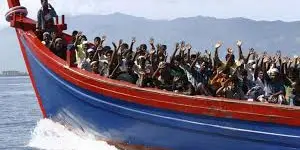
Malaysia’s UNSC Role Imposes Legal Obligations to Rescue Rohingya from Imminent Danger
May 08, 2015

By Charles Santiago
APHR Chairperson
Malaysian Member of Parliament
Over the last few days, we have tried to appeal to Prime Minister Najib Razak’s humane side—to his conscience—to rescue the thousands of Rohingya refugees who are adrift at sea.
This approach seems to have failed.
And therefore, we are now forced to look at the international laws that Malaysia has flouted by pushing the refugee boats back.
There is a legal obligation, under international maritime law, to rescue people in distress at sea, if the rescuing country does not put itself in imminent danger by doing so.
Malaysia has, however, craftily translated distress to mean sinking boats and drowning people, before it jumps in to offer aid.
At least ten refugees have died, and news reports say they are forced to drink their urine. It cannot get any worse than this, with the exception of dead bodies reaching our shores.
We have made our way into the United Nations Security Council. This is good news but it also means that there are provisions and rules we need to adhere to.
Malaysia’s UN Security Council role, compels it to uphold the Responsibility to Protect (R2P) through Resolution 1674 (Para 139). ASEAN can no longer hang onto the belief of non-interference, not when there is a clear and present danger to humanity.
And according to these rules, it is mandatory that we accept all Rohingya refugees—not just the ones who are facing imminent death at sea—as this is mandatory under the international law of non-refoulement.
This law dictates that no country should return refugees to places where they are persecuted or subjected to danger.
The minority Rohingya continue to face state-sponsored violence in Burma. They are also subjected to various discriminatory laws, which restrict their movement and ability to work or own assets.
If this is not enough, they were recently banned from having more than two children.
We have been seeing heartbreaking pictures of women and children, cramped together in boats and left to drift aimlessly at sea.
Malaysia has a duty and obligation to rescue these women and children as it has ratified the Convention on the Elimination of All Forms of Discrimination against Women (CEDAW) and also the Child Rights Convention (CRC).
Our very own law, the Anti- Trafficking in Persons makes it compulsory that as soon as someone is identified as the victim of trafficking, Malaysian authorities must present them before a magistrate within 14 days and secure an interim protection order. Then the trafficked victim must be placed in a government shelter.
It does not take a genius to figure out that all the people on the boats were victims of trafficking, abandoned at sea by the traffickers.
It is sad that we need to leverage existing legislation to compel a government to act with a conscience.
But just as the Rohingya Muslims are left with no choice but to flee, we are left with no choice but to get Malaysia to act by the book now, to save the lives of thousands of Rohingya refugees.
ASEAN Parliamentarians for Human Rights (APHR) was founded in June 2013 with the objective of promoting democracy and human rights across Southeast Asia. Our founding members include many of the region's most progressive Members of Parliament (MPs), with a proven track record of human rights advocacy work.